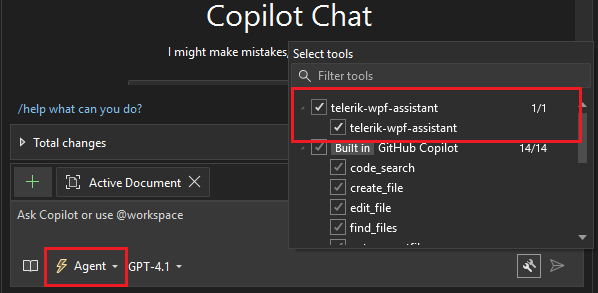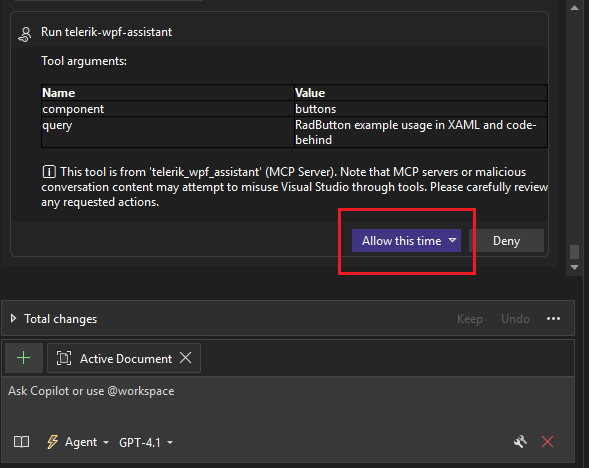Telerik WPF MCP Server
The Telerik WPF MCP (Model Context Protocol) Server enhances your AI-powered development experience by providing specialized context about Telerik UI for WPF components.
This MCP server enables AI-powered IDEs and tools to generate more accurate, tailored code that leverages Telerik UI for WPF components and APIs. You can ask complex questions about Telerik components, request specific implementations, and generate comprehensive code solutions.
Prerequisites
To use the Telerik WPF MCP server, you need:
- Node.js 18 or newer.
An MCP-compatible client that supports MCP tools (latest version recommended).
- An active DevCraft or Telerik UI for WPF license or a Telerik UI for WPF trial.
- (optionally) A .NET WPF application that includes Telerik UI for .NET WPF.
Server Installation
Install the Telerik WPF MCP server using npm:
npm i @progress/telerik-wpf-mcp
Server Configuration
Use these settings when configuring the server in your MCP client:
| Setting | Value |
|---|---|
| Package Name | @progress/telerik-wpf-mcp |
| Type |
stdio (standard input/output transport) |
| Command | npx |
| Arguments | -y |
| Server Name |
telerikWpfAssistant (customizable) |
License Configuration
Add your Telerik license key as an environment parameter in your mcp.json file using one of these options:
Option 1: License File Path (Recommended)
"env": {
"TELERIK_LICENSE_PATH": "THE_PATH_TO_YOUR_LICENSE_FILE"
}
The THE_PATH_TO_YOUR_LICENSE_FILE should point to the telerik-license.txt file, which is usually located in the AppData folder.
So, the field often will look like this: "TELERIK_LICENSE_PATH": "%appdata%/Telerik/telerik-license.txt"
Option 2: Direct License Key
"env": {
"TELERIK_LICENSE": "YOUR_LICENSE_KEY_HERE"
}
Option 1 is recommended unless you're sharing settings across different systems. Remember to update your license key when necessary.
Visual Studio Installation
For complete setup instructions, see Use MCP servers in Visual Studio.
Early Visual Studio 17.14 versions require the Copilot Chat window to be open when opening a solution for the MCP server to work properly.
Workspace-Specific Setup:
-
Add
.mcp.jsonto your solution folder.{ "inputs": [], "servers": { "telerik_wpf_assistant": { "type": "stdio", "command": "npx", "args": ["-y", "@progress/telerik-wpf-mcp@latest"], "env": { "TELERIK_LICENSE_PATH": "THE_PATH_TO_YOUR_LICENSE_FILE", // or "TELERIK_LICENSE": "YOUR_LICENSE_KEY" } } } } Restart Visual Studio.
-
Enable the
telerik_wpf_assistanttool in the Copilot Chat window's tool selection dropdown.
Global Setup:
To enable the server globally for all projects, add the .mcp.json file to your user directory (%USERPROFILE%, e.g., C:\Users\YourName\.mcp.json).
Usage
To use the Telerik MCP Server:
-
Start your prompt with one of these triggers:
-
/telerik/@telerik/#telerik -
/telerikwpf/@telerikwpf/#telerikwpf #telerik_wpf_assistant
-
-
Grant permissions when prompted (per session, workspace, or always).

Start fresh sessions for unrelated prompts to avoid context pollution.
You can check the Output pane of Visual Studio for diagnostics information related to Copilot. To display the relevant information, select to show output from GitHub Copilot.

Improving Server Usage
To increase the likelihood of the Telerik MCP server being used, add custom instructions to your AI tool:
Sample Prompts
The following examples demonstrate useful prompts for the Telerik WPF MCP Server:
- "
/telerikGive me an example of binding an ObservableCollectionto a RadGridView, including sorting and grouping." - "
/telerikWPFCreate a RadComboBox bound to a list of countries in MVVM, displaying country names but binding the SelectedValue to a CountryCode property." - "
/telerikShow XAML and ViewModel code for a RadTreeView bound to a hierarchical ObservableCollectionwhere each category contains products. Expand all categories by default."
Number of Requests
A Telerik Subscription license is recommended in order to use the Telerik WPF AI Coding Assistant without restrictions. Perpetual license holders and trial users can make a limited number of requests per year.
Local AI Model Integration
You can use the Telerik WPF MCP server with local large language models (LLMs):
- Run a local model, for example, through Ollama.
- Use a bridge package like MCP-LLM Bridge.
- Connect your local model to the Telerik MCP server.
This setup allows you to use the Telerik AI Coding Assistant without cloud-based AI models.